I Don't Want to Kill You Read online
Page 2
‘Can you believe this?’ asked Mom. ‘I thought we were through with all this!’
‘I know this killer,’ I said softly. Recognition was dawning slowly, but it was definitely there.
‘What?’
‘This is a real killer.’
‘Of course it’s a real killer, John – the pastor is really dead.’
‘No, I mean, this isn’t just a local guy – I read about this exact crime scene a few years ago. Did he take the hands too?’
The news anchor looked grim. ‘In addition to the poles in the back,’ he said, ‘the killer also cut off the pastor’s hands and removed his tongue.’
‘Ha!’ I said, half-laughing.
‘John!’ said my mom sternly. ‘What kind of reaction is that?’
‘It’s the Handyman,’ I told her. ‘He always does this to his victims: he cuts off their hands and tongue, and leaves them outside with sticks in their backs.’ I stared at the blurred crime-scene photo, shaking my head in wonder. ‘I had no idea he was a demon.’
‘He might not be,’ said Mom, standing up and carrying her dinner-plate into the kitchen. She’d seen the first demon, and she knew about the second, but she was still very uncomfortable discussing them.
‘Of course he’s a demon,’ I said. ‘Crowley was a demon, Forman was another demon who came looking for him, and now another demon has come looking for him.’
Mom was silent for a moment.
‘You have no way of knowing that,’ she said at last. I still hadn’t told her about my phone call to Nobody; she’d only get in the way by trying to protect me.
‘Do you have any idea of the odds against three unrelated serial killers in a town this size?’ I asked, following her into the living room. ‘And why on earth would the Handyman, whose attacks have all been in Georgia, show up in Clayton County North Dakota for no reason at all just two months after the last demon disappeared?’
‘Because this town is cursed,’ she said adamantly.
‘I thought you didn’t believe in supernatural stuff?’
‘I don’t mean literally cursed,’ she said, turning back to me. ‘I mean . . . oh, I don’t know what I mean. They’re demons, John! Or something just as bad. I don’t know how much longer we can stay.’
‘We can’t leave,’ I said quickly. Too quickly. Mom stared at me a second, then pointed at me angrily.
‘Oh no,’ she said. ‘No no no no no. You are not going to chase after this one like you did with Bill Crowley. You are not going to play Superhero and risk your life like an idiot.’
‘I’m not an idiot, Mom.’
‘Well, you do some awfully stupid stuff for a genius,’ she said. ‘Crowley tried to kill you. Forman almost succeeded, and he almost got Brooke too. And Curt. This is not a game.’
‘I didn’t realise you were so worried about Curt’s life.
‘I don’t want him dead,’ she shouted. ‘I just want him out of our lives! He’s an arrogant jerk, yes, but you can’t just kill him.’
‘Then it’s a good thing I didn’t,’ I said, growing angry myself.
‘No, but because of your obsession with these . . . whatever they are . . . somebody else almost did. How many people have to die before you back down?’
‘How many more people will die if I do back down?’ I countered.
‘That’s what police are for.’
‘The Handyman’s been killing for five years at least – probably centuries more, now that we know he’s a demon. If the police are so awesome why haven’t they stopped him yet?’
‘You are not going after him,’ Mom repeated.
‘The police have no idea how to fight a demon,’ I said, struggling to keep my voice calm. ‘They have no idea what they’re up against. I do. I’ve already stopped two of them, and if I can stop this one, I can save . . . I don’t know, maybe hundreds of lives. Maybe thousands. Do you think it’s just going to kill a couple of people and then go away forever? This is how these things live, Mom. It’s going to kill and kill and kill until it doesn’t have any victims left.’
‘He,’ said Mom firmly, locking my eyes with her gaze.
‘What?’
‘You called him “it”,’ she said, exerting all her authority. ‘You know that you are not allowed to say “it”. Say “he”.’
I closed my eyes and took a breath. One of the hallmarks of a sociopath, particularly a serial killer, is that they stop thinking about people as people, and see them only as objects. When I wasn’t thinking, or when I got excited, I started calling people ‘it’. This was against my rules.
But the rules were designed for humans.
‘It’s a demon,’ I said. ‘It’s not a person, it’s not human. I can’t dehumanise it if it’s not human.’
‘He is a living, thinking creature,’ said Mom, ‘human or demon or whatever. You don’t know what he is, but you know who you are, and you will follow your rules.’
My rules. She was right. ‘I’m sorry,’ I said, calmer now. ‘He – or she,’ I added quickly. ‘This might turn out to be a woman.’
‘What makes you say that?’
Because the voice on the phone was female, I thought.
‘Nothing,’ I said. ‘I’m just saying that we don’t know.’ I put on a face of mock indignation. ‘Are you implying that all psychopaths are men? Or that all men are psychopaths?’
‘I’m not in the mood for jokes,’ Mom said, turning off the TV. ‘I’m going to bed. No more news, no more killers; we’ll talk about this in the morning.’
I walked sullenly back to the kitchen and poured a bowl of cereal while Mom got ready for bed; I rarely went to sleep before 2 a.m., so there was still plenty of time to study the situation.
I’d read about the Handyman before. He was an unorthodox killer from Macon, Georgia – or at least, that’s where his first and third known victims were found. He travelled all over Georgia killing every nine months or so, and every crime scene matched our new situation: the victims were killed inside, usually in their place of business or alone at home, and there the body’s hands and tongue were removed. Then the body was carried outside, the poles were stuck into its back, and the killer disappeared.
The police had yet to find any real evidence of who the killer might be, though they could guess some things just by analysing the crimes themselves. First of all, everyone assumed it was a man, based on two things: the sheer physical strength involved in hacking off the hands, carrying the bodies outside, and driving the wooden poles into the victims’ backs. Also for the simple fact that almost all serial killers were men anyway. Neither of these were especially strong bits of evidence, but psychological profiling is more of an art than a science. They took the information they had and went with the answers that made the most sense.
The other thing the police knew about him was that he was very clean: the sites where the actual deaths took place were always full of plastic, including sheets and garbage bags and even disposable rain ponchos. This was not a person who wanted to get any blood on himself, and the lack of usable exterior blood evidence showed that he was very good at keeping himself clean. That penchant for neatness, plus the use of mops and brooms as poles in his victims’ backs, had earned him the media nickname ‘Handyman’. Well, that and the fact that he cut his victims’ hands off.
I took another mouthful of cereal. The police and the FBI had been hunting the Handyman for years, but I knew they’d never catch him because they were working from flawed assumptions: namely, that he was human, and male. No matter what Mom said, he was most definitely a demon, and almost certainly female. I’d talked to her on the phone, for crying out loud – I think I could tell the difference. And that helped explain everything in vastly different ways.
To begin with, the strength: the demons had all revealed an array of bizarre supernatural powers, and it made perfect sense that the Handyman had above average strength, regardless of gender. Female serial killers were remarkably rare, but they did exist; so
why not female demons as well? Assuming they had gender at all, they probably had representatives from both.
As for the cleanliness, a strong attention to detail suggested . . . what? That the demon was neurotic? Cautious? Scared of blood? If I could get on the computer I could look up some of the criminal-profiling websites I liked to read, but Mom kept the computer in her room and I didn’t dare do this kind of research with her looking over my shoulder.
There was so much else this demon was telling us, if only I knew what it meant: things like why she displayed her victims outside, and why she shoved poles into their backs. These were messages directly from her to us – in fact, they might be messages directly to me, since I was the one she was here to find. But what did they say? I’d studied serial killers for years, as a hobby bordering on obsession, but most of my knowledge was trivia about who a killer was, how they did it, and so on. I knew why a killer did what he did, but only after the fact; I didn’t know the steps the police had taken to decipher all of that information in the first place. I needed to do more study, which meant I needed the Internet or the library. I couldn’t get either one until morning.
I finished my cereal and glanced at the clock: ten thirty. Morning was still hours away.
There was one other area where I had a definite leg up on the police, and I didn’t need their studies to help me: the missing body parts. Most serial killers saved souvenirs from their kills because they liked to relive them, or in some cases because they simply wanted to eat them, but demons were different. Mr Crowley, the Clayton Killer, had stolen his victims’ body parts because he needed them to regenerate his own failing limbs and organs. The Handyman – Handywoman? – might be doing the same thing, or something similarly supernatural. What could you do with hands? And what about tongues? What did they represent?
I stared at my own hands, looking for clues. Maybe she could absorb their fingerprints, or their identity, or something like that. It was hard enough to profile a regular killer who followed human rules; for a demon who broke those rules at will, I needed more information before I could say anything solid. I needed to see the demon in action.
Both of the demons I had met so far were completely different. They did different things, in different ways, for different reasons – but they had one similarity. Forman had said that the demons, or whatever they were, were defined by what they lacked: a face, a life, an emotion, an identity. Just like serial killers, the way they acted and reacted could be traced back to the holes in their lives that made them who they were. So, what did Nobody lack?
The phone rang, loud and strident in the silence. I grabbed it off the counter and glanced at the caller ID: Jensen. I carried it down the hall and handed it to Mom, who was washing off her make-up in the bathroom. It rang again.
‘Officer Jensen,’ I said, setting it on the sink. ‘Probably something about the case.’ I walked back to the living room while Mom answered.
‘Hello? Oh!’ She sounded surprised. ‘Why, hello Marci, I thought it was your father.’
Marci Jensen was calling? Marci was one of the hottest girls in school. Even my friend Max, who’d go out with a chair leg if it asked him, harboured an impossible love for her. I’d probably talked to her three times in my entire life. Why was she calling my house at ten thirty at night?
‘Don’t worry,’ said Mom, ‘we’re both still awake. He’s right here, I’ll get him.’ She came out of the bathroom with one of those infuriating motherly smiles and handed me the phone. ‘It’s for you.’
I held it to my ear. ‘Hello?’
‘Hey John, it’s Marci Jensen.’ She sounded . . . I had no idea how she sounded. I could read a face like an expert, but voices always threw me off.
‘Yeah, I saw.’ Pause. What should I say?
‘I’m sorry to call you so late,’ she went on. ‘I’ve kinda been . . . well, I’ve been meaning to call all day and I just haven’t.’
‘Oh.’ Why was she meaning to call?
‘So anyway, I don’t know if I’m supposed to say this or not, but my dad told me about you. About what you did, I mean. Saving all those people.’
Thanks to the ‘protective silence’ that kept my name out of the news, her dad was one of the only people who knew the real story. Well, the parts that didn’t have demons in them. He’d been the first officer on the scene when we escaped from Forman’s torture house in the forest.
‘It’s not really anything,’ I said. ‘I mean, it is, because they’re all saved, but I didn’t really do anything. I mean, I didn’t do it alone. Brooke was there too; she helped get some of the women outside.’
‘Yeaaaah,’ said Marci, holding the vowel and dragging out the word for a few extra seconds. She paused, just slightly, and then said: ‘I heard that you guys aren’t really going out any more?’
‘No,’ I said, a little surprised. Is this what I think it is? ‘We haven’t really done anything for a couple of months, actually.’
‘Yeah, I wish I’d known that sooner,’ she said. ‘So anyway, I thought if you’re not dating anyone else, maybe we could go out sometime.’
Was that an observation or an invitation? Had she just asked me out, or was I supposed to ask her? I had no idea what to do. After a pause I said, ‘Sure. That sounds fun.’
‘Sweet,’ she said. ‘I’m all tied up for the rest of this week, but how about one week from today? Monday afternoon?’
I had a brief mental image of Marci tied up, but I shoved it away. Don’t think like that. ‘Yeah, I should be free.’
‘Sweet,’ she said again. ‘We can go to the lake. You have a bike?’
‘Yeah.’
‘Cool. You want to meet at my place? It’s pretty close to the turn-off, and we can head out from there.’
‘Sure,’ I said.
‘Three o’clock?’
‘Sure.’
‘Well, awesome,’ she said. ‘I’m glad I finally called.’
‘I . . . so am I.’
‘All right, I’ll see you then. Bye.’
‘Bye.’
She hung up, and I clicked off the phone. Mom was still standing there, watching. She always insisted that I try to be more social, and at the same time she always seemed to be terrified of what I would do.
‘Did you just get asked out?’
‘Apparently.’
She stared at me a moment longer, then nodded and turned back to the bathroom. ‘Be careful,’ she called out. ‘And make sure to follow all your rules.’
I frowned and took another bite of cereal. Why had Marci asked me out? This was not the best time; I had a demon to catch, and this was a complication I didn’t need. On the other hand, it was kind of funny: now there were two people in town who wanted to kill me – the Handyman, and Max, as soon as he found out I had a date with Marci. I laughed, and the sound was thin and hollow.
The game is afoot.
Chapter 3
When a person is murdered, the details of the case are kept secret, and thus it was with Pastor Olsen: we knew where he had died, and what the body looked like, but the police kept the rest of the details to themselves. Nobody was allowed to see the crime scene except the investigators, and no one was allowed to see the body except the forensic pathologist . . . and the morticians.
Thus it was that five days after the killing, when I’d analysed the news coverage a hundred times and run out of leads and was desperate for more information, the FBI delivered the corpse right to our very door.
I have the best job in the world.
My mom co-owns the mortuary with her twin sister, Margaret, and I’d been helping with funerals and general maintenance since I was seven years old. It was my dad who first showed me the embalming tools, back before he left, and it had been my passion ever since. My sister helped in the office, pushing papers and answering phones; she got a little creeped out by the dead bodies, or so she claimed, but I could never understand how that was even possible. Dead bodies are calm and silent; perfectly still, per
fectly harmless. A corpse will never move, it will never laugh, and it will never judge; a corpse will never shout at you, hit you, or leave you. Far from the zombies and junk that you see on TV, a corpse is actually the perfect friend. The perfect pet. I feel more comfortable with them than I do with real people.
Ron, the County Coroner, brought the pastor’s body in his big government van, accompanied by a couple of policemen as escorts. I stayed upstairs until they were gone, watching through the window as they opened the van doors, pulled out the covered stretcher, released the wheels, and rolled him in through our back door. The police escorts paced aimlessly in the parking lot; they stared at the sky, or at the forest behind our house, or at the cracks in the asphalt below them. It was mid-August, and the cracks were full of ants scuttling back and forth on urgent, mysterious errands. One of the policemen stooped down to watch them, then stood again and dragged his foot across the crawling mass. The swarm scattered, reformed, and went on with their lives. The cop wandered away, his attention caught by something else.

 Partials
Partials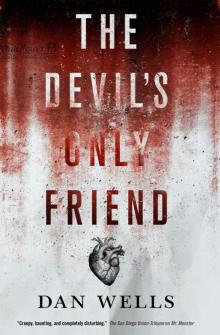 The Devil's Only Friend
The Devil's Only Friend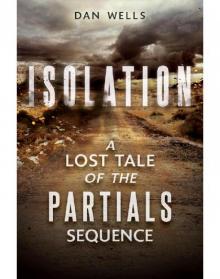 Isolation
Isolation I Don't Want to Kill You
I Don't Want to Kill You Ones and Zeroes
Ones and Zeroes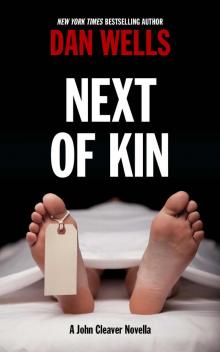 Next of Kin
Next of Kin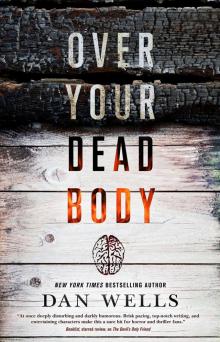 Over Your Dead Body
Over Your Dead Body Fragments
Fragments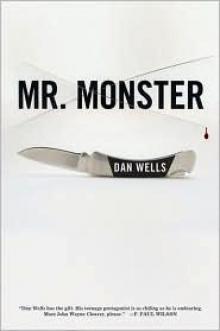 Mr. Monster
Mr. Monster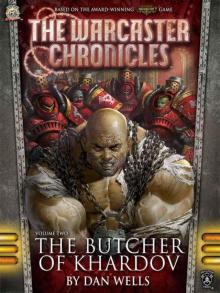 The Butcher of Khardov
The Butcher of Khardov I AM NO T A S E RI AL KI L L E R
I AM NO T A S E RI AL KI L L E R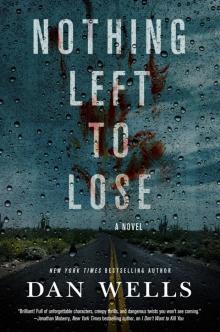 Nothing Left to Lose--A Novel
Nothing Left to Lose--A Novel Active Memory
Active Memory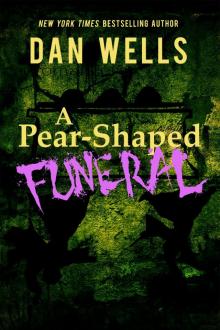 A Pear-Shaped Funeral
A Pear-Shaped Funeral I Am Not a Serial Killer
I Am Not a Serial Killer Bluescreen
Bluescreen Ruins
Ruins Zero G
Zero G The Hollow City
The Hollow City Extreme Makeover
Extreme Makeover Partials p-1
Partials p-1 The Complete John Wayne Cleaver Series: I Am Not a Serial Killer, Mr. Monster, I Don't Want to Kill You, Devil's Only Friend, Over Your Dead Body, Nothing Left to Lose
The Complete John Wayne Cleaver Series: I Am Not a Serial Killer, Mr. Monster, I Don't Want to Kill You, Devil's Only Friend, Over Your Dead Body, Nothing Left to Lose